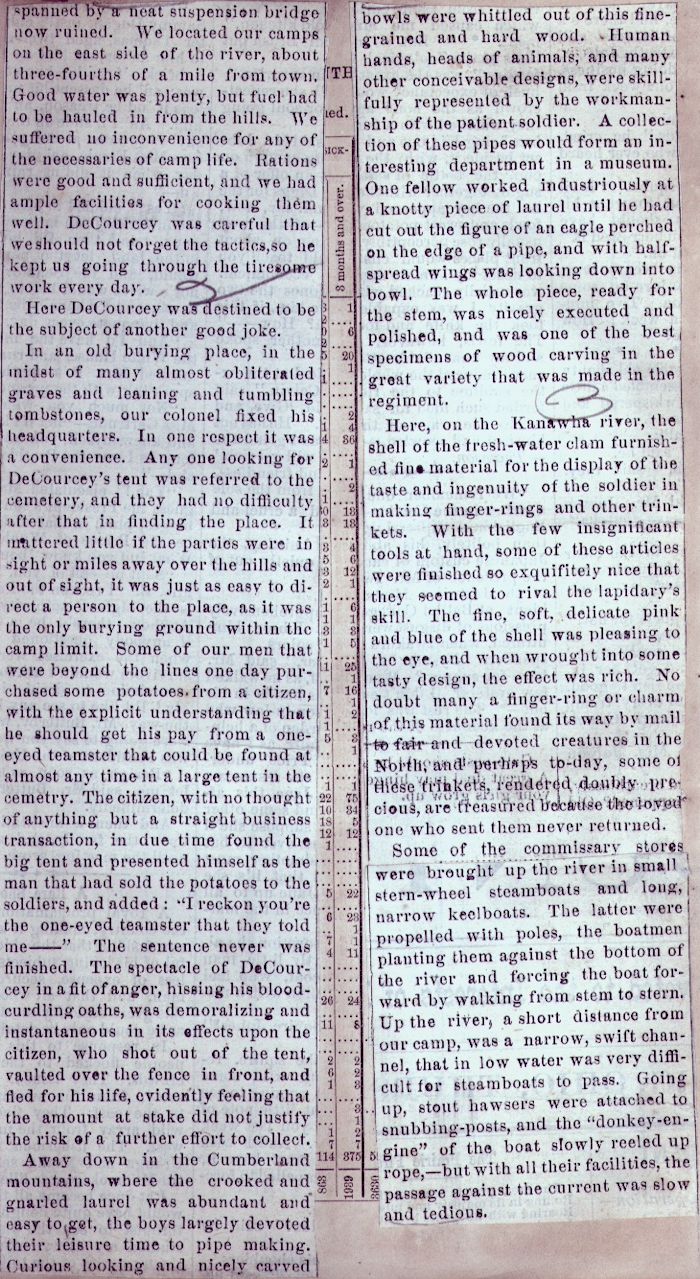| Camp & Field Page 44 | Camp & Field Index Page | 16th OVI Home Page | Camp & Field Page 46 |
The Camp & FieldArticles by Theodore Wolbach |
 Cpl. Theodore D. Wolbach |
The following image is taken from a book titled "Mortality and Statistics of the Census of 1850" in which it is believed retired Captain Rezin H. Vorhes, Company H, pasted over the pages a series of articles written by Cpl. Theodore D. Wolbach, Company E, titled "Camp and Field" and published, by chapter, in the Holmes County (Ohio) Republican newspaper from February 24, 1881 to August 17, 1882. The articles tell the story, in great detail and color, of the 16th OVI, from the inception of the 3-year regiment in October, 1861, through all its camps, battles and marches until it was disbanded on October 31, 1864. The articles pasted in the Vorhes book cover the first 35 chapters, published through October 20, 1881. All the remaining chapters were recently found in a Holmes County library by researcher Rob Garber who obtained copies, performed the transcriptions and provided to this website and which are also presented here, thus providing the complete work by Theodore Wolbach.
Throughout these articles click on the underlined white text for additional details.
The webauthor thanks 16th Ohio descendant Rob Garber for his excellent research on the Camp And Field articles and for performing the tedious digital transcription of those articles found on each page. The transcriptions were made to reflect the original articles verbatim, misspellings and all. Rob is the 3rd great nephew of Capt. William Buchanan, Company F, 16th Ohio, who served in the 90-day regiment as a private, re-enlisting in the three year regiment, and eventually making the rank of Captain of Company F. Thanks Rob!
Page 45 - Chapter 28 - October, 1862
 |
spanned by a neat suspension bridge now ruined. We located our camps on the east side of the river, about three-fourths of a mile from town. Good water was plenty, but fuel had to be hauled in from the hills. We suffered no inconvenience for any of the necessaries of camp life. Rations were good and sufficient, and we had ample facilities for cooking them well. DeCourcey was careful that we should not forget the tactics, so he kept us going through the tiresome work every day. Here DeCourcey was destined to be the subject of another good joke. In an old burying place, in the midst of many almost obliterated graves and leaning and tumbling tombstones, our colonel fixed his headquarters. In one respect it was a convenience. Any one looking for DeCourcey's tent was referred to the cemetery, and they had no difficulty after that in finding the place. It mattered little if the parties were in sight or miles away over the hills and out of sight, it was just as easy to direct a person to the place, as it was the only burying ground within the camp limit. Some of our men that were beyond the lines one day purchased some potatoes from a citizen, with the explicit understanding that he should get his pay from a one-eyed teamster that could be found at almost any time in a large tent in the cemetery. The citizen, with no thought of anything but a straight business transaction, in due time found the big tent and presented himself as the man that had sold the potatoes to the soldiers, and added: Away down in the Cumberland mountains, where the crooked and gnarled laurel was abundant and easy to get, the boys largely devoted their leisure time to pipe making. Curious looking and nicely carved |
bowls were whittled out of this fine-grained and hard wood. Hyman hands, heads of animals, and many other conceivable designs, were skillfully represented by the workmanship of the patient soldier. A collection of these pipes would form an interesting department in a museum. One fellow worked industriously at a knotty piece of laurel until he had cut out the figure of an eagle perched on the edge of a pipe, and with half-spreads wings was looking down into bowl. The whole piece, ready for the stem, was nicely executed and polished, and was one of the best specimens of wood carving in the great variety that was made in the regiment. Here, on the Kanawha river, the shell of the fresh-water clam furnished fine material for the display of the taste and ingenuity of the soldier in making finger-rings and other trinkets. With the few insignificant tools at hand, some of these articles were finished so exquisitely nice that they seemed to rival the lapidary's skill. The fine, soft, delicate pink and blue of the shell was pleasing to the eye, and when wrought into some tasty design, the effect was rich. No doubt many a finger-ring or charm of this material found its way by mail to fair and devoted creatures in the North, and perhaps to-day, some of these trinkets, rendered doubly precious, are treasured because the loved one who sent them never returned. Some of the commissary stores were brought up the river in small stern-wheel steamboats and long, narrow keelboats. The latter were propelled with poles, the boatmen planting them against the bottom of the river and forcing the boat forward by walking from stem to stern. Up the river, a short distance from our camp, was a narrow swift channel, that in low water was very difficult for steamboats to pass. Going up, stout hawsers were attached to snubbing-posts, and the |
| Camp & Field Page 44 | Camp & Field Index Page | 16th OVI Home Page | Camp & Field Page 46 |